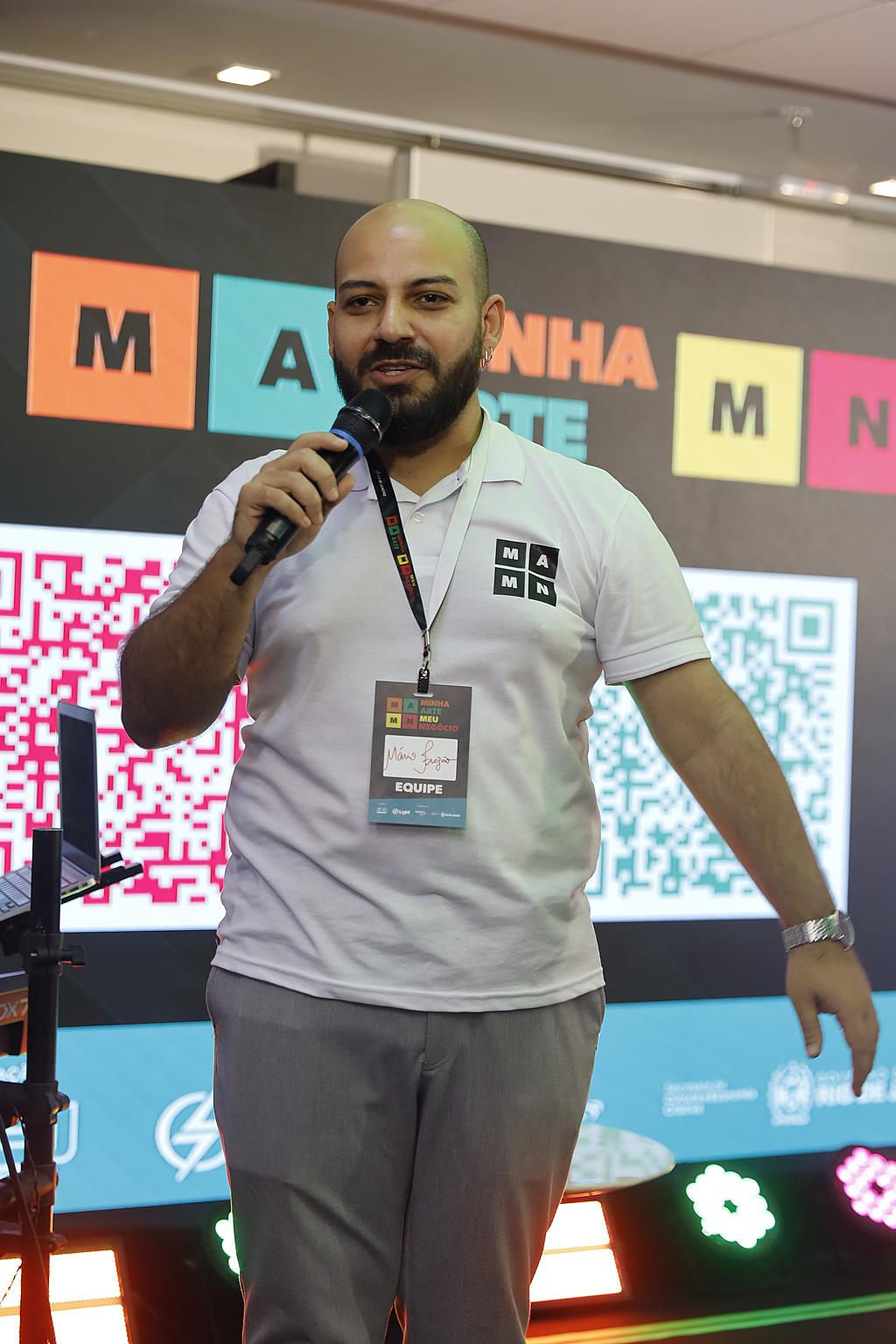The next edition of the event takes place this Thursday (29) in Sapucaia
Educator and specialist in creative economy, Mário Frazão takes on the pedagogical direction of the project “Minha Arte, Meu Negócio” (MAMN), an event that arrived at the Novotel de Botafogo, in Rio de Janeiro, on May 15, with the objective of training artists and cultural professionals to transform their talents into sustainable businesses. The initiative is carried out by LEP Produções and has the support of big names in the artistic and cultural sector.
Aimed at musicians, actors, dancers, producers, visual artists and other professionals in the creative economy, the event promotes meetings, lectures and mentoring with market experts, addressing topics such as career management, fundraising, networking and personal marketing. The curatorship of Mário Frazão structures the content in a practical and accessible way, reflecting his commitment to the democratization of knowledge in the artistic sector.
In addition to the Rio de Janeiro edition, the project will be held in other cities in the state, such as Sapucaia (May 29) and Miguel Pereira (June 7), expanding the scope of the proposal and bringing entrepreneurial training to regions that often lack this type of opportunity. For Frazão, the event is an important step towards strengthening the cultural sector as an economic and social power.
“Minha Arte, Meu Negócio” is sponsored by LIGHT, the BAT Institute, and supported by the Government of the State of Rio de Janeiro, through the State Secretariat for Culture and Creative Economy, via the State Law for Cultural Incentive.
As the Educational Director and curator of “Minha Arte, Meu Negócio”, you have closely followed the challenge of transforming artists into entrepreneurs. What do you consider the first step for an artist to actually start looking at their art as a business?
The first step is different for each artist, in each place in the country that we visit. Holding this event in Rio de Janeiro and Juazeiro do Norte, Ceará , for example, requires us to understand different realities of training, professionalization and the market for artists in Brazil. But, in general, we still deal with a mentality that art is always driven by passion, which is true, but this leads to the idea that if the artist is passionate about his art, he can receive any amount, or receive any accommodation, or does not need to have a logo or a professional email. So, the first step, trying to make a dangerous generalization ( lol ), I would say is to take art from being just about passion and put it in the place of a craft that requires formalization, professionalization and managerial skills.
We live in a time when there are several lines of incentive for culture, but many artists still cannot access or manage these resources effectively. In your opinion, why does this gap still exist — and how can MAMN help change this scenario?
This is due to the major problem with national development, which is bureaucracy and communication. Communication about how to access resources from the creative economy is far from what it should be, and when it does arrive, it buries artists in bureaucracy that they are not prepared for. What we do at MAMN is to bring information to the target audience . That is why we explain what is possible, during the event, about the resources of the main incentive laws, how to follow the notices, how to approach companies for resources that do not depend on notices and how they need to have their “business” organized to have a chance of being awarded these resources, because many of them do not even have a CNPJ.
With such a rich and diverse program, the event ranges from dance and audiovisual to crafts and music production. How did you structure the curation to ensure that all cultural professionals felt represented and welcomed?
This was a very difficult part. In fact, by 2026 we intend to launch segmented events, initially, at least one event for music, another for visual arts and another for plastic arts and ancestral crafts. But now, the most difficult part was not the theme selection, because somehow every artist has an Instagram , is protected by copyright, needs production knowledge… anyway, but my main concern was to align, individually, the language of each of our teachers, so that they could, during their speech, expand the examples, the possibilities of describing their content, so that everyone present could, in some way, absorb something important from each class.
The event will be held in Rio de Janeiro, but will also be held in cities such as Sapucaia and Miguel Pereira. How important is it to decentralize this type of training and bring knowledge to artists who are outside the major centers?
Rio de Janeiro is an important showcase, but the interior is always the focus of LEP Productions, because that is the DNA of the project’s producer, Tayana Santos. She is a great partner and proponent of this event and dreams of a cultural structure that reaches places no one wants to go, or where big brands and events are not usually interested. These are exactly the places we want to go. Can you imagine the incredible artists that exist in the interior of the country?

MAMN welcomes renowned names such as Carlinhos de Jesus, Amanda Françozo and Alexandre Barillari. How do these participants contribute not only to inspiring, but also to creating real bridges between those who are just starting out and those who have already followed a long path?
These names were not chosen at random. All of them are building a project alongside their artistic careers, with lectures, workshops, writing books, and something in the intellectual field. Because it is not enough to be an artist in the field and know how to do it, you need to have some teaching skills, some experience in transferring knowledge. And this team has plenty of that. Those who come to watch often come as fans, but soon realize that they have quickly become students.
You believe that entrepreneurship in art requires a combination of sensitivity and strategy. What do you see most lacking in independent artists today: technique or vision of the future?
I don’t think so. The artist understood that he has to be an artist, manager, producer, social media, and also understand copyright and accounting so as not to be taken advantage of by any bad-faith person, of whom there are many out there. This becomes very exhausting when you don’t know how to do it and do everything “however you can”. Undertaking an art business is a bit like dealing with the frustration of the difference between success and fame, which is something I talk about a lot. If you aim for success, you can have a good, long career, with a good financial return, and build quality artistic work without necessarily being famous. The search for fame exhausts people. Those who seek fame don’t undertake business, because they want several people around them to do it for them, because the illusion of fame is this golden dream. Undertaking an art business is learning intelligently to “play” in the main positions until you grow, as you probably can, and have a career that allows you to have a decent life as an artist.
Your journey within cultural pedagogy has impacted many projects over the years. What moves you most personally about seeing MAMN take shape and transform lives?
In fact, I have been working with culture for a long time, but I come from the publishing industry, so for a long time my universe was just writers. Then I worked on audiovisual media and now, finally, music, shows and other projects that LEP has allowed me to work on. I have been at MAMN since 2023 and each city, each event, holds a new surprise. I think this project is extraordinary, and it should take Brazil by storm, because artists are spread all over the place, but the spotlight is not on these corners (i.e. the far corners of the country). So what drives me in this project is to make artists from faraway places feel like they are truly artists, a feeling that they often do not have. We can at least awaken this self-esteem, the image of an artist, in them.
In addition to technical training and networking, the event also proposes a change in mindset. If you could give one piece of advice to the artists who will participate in this edition, what would it be?
Look, I would say that if you come to an event like this, be truly present, with your mind, your soul, your time. Be there fully, to enjoy every word, every gesture, every image, every slide. Participate, ask questions, interact, because we do our part, but there is a percentage of the event’s success that depends on how much this audience is really willing to be there with us. I think that’s it.
Follow on Instagram: Mário Frazão | My Art My Business





